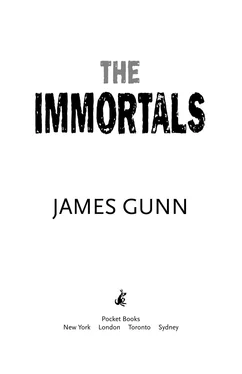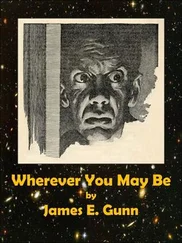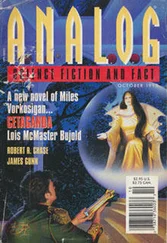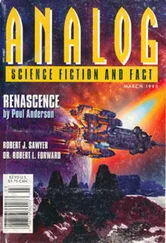As the chest cavity was closed, the new heart began squeezing powerfully, forcing the blood through the healthy new arteries.
Cassner would have had a good excuse for turning the more routine job over to the assistant, but he completed the arterial job before he turned away toward the dressing room… That’s what the scoffers forgot, Flowers thought—what a man got for his money: the skill, the drugs, the instruments. Twenty years earlier, without modern medicine, the man on the operating table would have died.
That man wasn’t too healthy. If he were any less healthy, he’d be dead. Now he was good for five to ten years more.
“That’s nothing,” Mock said. “I saw Smith-Johnson save a five-month fetus and I had to wonder: Why?”
Flowers looked scornful. He knew why: It was because life was sacred, any life, all life. That’s what a doctor bowed down to.
“Sometimes in the night,” Mock said distantly, “I can hear their voices wailing, muffled by the incubators, all the premies that were too weak to live, that nature wanted to be rid of, and we saved—for blindness and disease and perpetual care. Oh, Cassner’s good, but I wonder: How much did the operation cost?”
“How should I know?”
“Why don’t you find out?”
Flowers shivered in the darkness, although the room was hot, and pushed his hands into his pockets. He touched his belt buckle.
He started, and wondered why he hadn’t thought of it before. He pushed the alarm button hastily.
It was a chance, and any chance was worth trying. He supposed that the hijackers had turned off the ambulance motor when they parked it.
Flowers sank back against the wall, remembering how he had gone to the business office. They had taken down his name, but they had shown him the statement. The old man had put down a $200,000 deposit. The business office had figured it pretty shrewdly. The total bill was only a few hundred less.
He glanced down the Debit column with its four- and five-digit numbers:
Operating Room: $40,000
Well, why not? The heart machine alone had cost $5,000,000, and that microsurgery had been the marvel of the Middle West when it had been constructed and equipped. Someone had to pay for it.
After that was the room fee, anesthesia, laboratory fees, X-ray, tissue exam, EKG-EEG-BMR fee, drugs and dressings, and, most prominently, the prices for new organs and arteries:
New Arteries (1 set): $30,000
New Heart (1): $50,000
Some poor devil of a defaulter had paid his bill.
Flowers sat in the concrete cell and told himself that a medic shouldn’t have to weigh questions of relative value. So the operation had cost the old man $30,000 to $40,000 for each year of life it promised him. It was worth it—from the old man’s viewpoint. Was there another viewpoint? Was someone else footing the bill?
Society, maybe. Was it worth it to society? Maybe not. The old man was a consumer now, eating up and using up what he had been smart enough or strong enough or ruthless enough to have produced when he was younger.
So maybe it wasn’t worth it to society.
That was a brutal, inhuman viewpoint. That was the reason nobody wanted society to be the judge of what was worthwhile. Medicine had been fighting that possibility for centuries; on that point the AMA was immovable. A man had an inalienable right to the doctor of his choice and the medical treatment he could afford.
Of course, of course. It illustrated the danger of looking at the problem all backward, as Hal Mock might. The knowledge was there; the skill was there; the equipment was there. If it wasn’t used, it would be an outrageous waste.
But maybe, he thought sharply, the mistake came earlier, in developing the knowledge, the skill, and the equipment in the first place. That was when society footed the bill.
Society puts a price on everything. In every era there are limited quantities of intelligence, energy, and what people collectively inherit from the thought and labor of the past, capital. Society’s value system determines how these assets are distributed among a thousand different enterprises.
It was like a budget: so much for food, so much for shelter, so much for clothing, education, research, entertainment; so much for the doctor.
What was more valuable than good health? Nothing, said society. Without it, all is worthless.
What did Mock mean when he said we can be too healthy?
Was there an optimum beyond which medicine consumed more than it produced in benefits? And was there a point past that at which medicine became a monster, devouring the society that produced it?
Maybe the cost of living could be too high. Maybe a society could be too healthy, like a hypochondriac, spending itself into bankruptcy in a vain effort to cure small or fancied ills.
“Charley,” he asked Brand one day, “what percentage of the national income went into medicine last year?”
“Therapy, education, research, production, or construction?”
“Everything.”
“Let’s see—fifteen point six, ten point one, twelve point nine, five point two, eight point seven—that’s—what does that add up to?”
“Fifty-two point five,” said Flowers.
In the darkness of the concrete room, he repeated the figure to himself. “Nonsense,” he muttered.
It was a relief from thought to discover that the recorder was running. He had only to press the playback stud to discover the identities of his captors.
He pressed the stud and listened, engrossed, to the voices of Leah and Russ and himself… But before the tape reached Leah’s frightened cry, the door swung open and a blinding light dazzled his eyes.
He stabbed the recorder into silence and cursed silently. He had lost his chance.
“Who are you?” he demanded.
“Police officers,” said a harsh voice. “Didn’t you send out an alarm?”
“Get that light out of my eyes,” Flowers said suspiciously. “Let me see you.”
“Sure.”
The light turned away, splashed against dark trousers, lighter tunics, glittered on badges, exposed faces, caps.
One of the two officers looked familiar; surely that was the sergeant to whom he had turned over the shover.
“Well, Medic,” the sergeant said, “we meet again, eh? Come on, we’d better get out of here.”
“Certainly, but where’s the ambulance? Did you find it? Did you catch the hijackers? Did you—”
“Hold it.” The sergeant chuckled. “We ain’t got time for everything now. The hijackers might come back, eh, Dan?”
“You bet,” said Dan.
They went down long marble corridors, echoing with their footsteps, opening before them as the flashlight moved forward into the darkness. They reached a wide hall. On each side were three sets of heavy brass doors, one set standing open. Behind it was an elevator. Flowers followed the officers into the car. The sergeant pushed a button. They started up with a jerk. The elevator creaked and rattled and wheezed until Flowers wondered whether it would ever make it. That was the sound he had heard in the concrete room, he thought. He leaned back wearily against the ornate brasswork of the wall and thought, I’m lucky.
In his moment of safety he found time to wonder about Leah. Was the blind girl all right? Surely she hadn’t been hurt. And her father—what was familiar about his face?
It reminded him of a picture, of the time he had wandered through the hall of past presidents in the courthouse headquarters of the county medical society. There were dozens of the portraits, all done in dark oils, all with their solemn faces and their stern eyes that seemed to watch him as he passed, as if to say, “We received the great Aesculapian tradition intact, unblemished; we hand it down to you, unchanged. Live up to it if you can.”
Читать дальше












